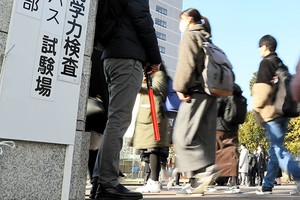THE ASAHI SHIMBUN
December 2, 2022 at 14:53 JST
 Prime Minister Fumio Kishida speaks at the Dec. 1 session of the Upper House Budget Committee. (Koichi Ueda)
Prime Minister Fumio Kishida speaks at the Dec. 1 session of the Upper House Budget Committee. (Koichi Ueda)
The Kishida Cabinet approved a bill on Dec. 1 designed to help those whose lives have been adversely affected due to making huge donations to any organization.
The legislation stems from the criticism directed at the Unification Church, formally known as the Family Federation for World Peace and Unification, for preying on the fears of bad luck or misfortune by members to obtain donations that have often left families in dire straits.
The ruling coalition is seeking to pass the bill in the current extraordinary Diet session, which is scheduled to end on Dec. 10.
Opposition lawmakers argued that the legislation as currently written would have a very limited effect because of narrow definitions of what solicitations are banned as well as how children and spouses can seek the return of donations made by members.
Jun Azumi, the Diet affairs committee chairman of the opposition Constitutional Democratic Party of Japan, met on Dec. 1 with his counterpart from the ruling Liberal Democratic Party, but no decision was made on a schedule of Diet deliberations for the victim support bill.
Azumi pointed out that the ruling coalition was seeking to pass the bill sometime next week, but that more time was needed to hear testimony from those who have suffered damage as well as from lawyers who have dealt with such victims.
The ruling coalition is arguing that it took into consideration some of the points raised by the opposition during talks leading up to the drafting of the bill.
One such point is the requirement of organizations to “take into consideration” that they do not restrain the free will of members and make it difficult for them to make appropriate judgments about donations.
The opposition wanted a ban on such restraint of the free will of members.
The bill does include six acts that are banned during the solicitation process if used to mislead the potential donor into making a donation. Among the banned acts are seeking donations to ward off bad luck or misfortune, or refusing to let a prospective donor go home.
Other provisions call for the return of donations if inappropriate acts were involved during solicitation. The donors would have up to 10 years to seek a return of the donation.
While there is another provision to allow children and spouses to act on behalf of the organization member in seeking a return of donations, past victims and lawyers point out the wording would not help very many victims.
For one thing, children would only be able to seek the return of money that would have gone toward raising them.
But in cases when the member is middle-aged or older, adult children would not be able to ask for a return because they are no longer a dependent of the parent.
Minor children also may not realize that their lives are being placed under strain and would not know to ask for a return of donations so their future lives are not impacted. By the time they realize what has occurred, they may no longer require child support and the rationale for seeking a return would be lost.
And if the member who made the donations was a homemaker with little or no income, it would be difficult to recognize that she had an obligation to provide child support so the children would be unable to seek a return of the donation.
When asked about the proposed legislation at the Dec. 1 session of the Upper House Budget Committee, Prime Minister Fumio Kishida indicated the possibility of putting into writing after it passes the Diet an interpretation of the wording to make it easier to implement and be more effective.
(This article was written by Mihoko Terada and Yuta Kayaba.)




















A peek through the music industry’s curtain at the producers who harnessed social media to help their idols go global.
A series based on diplomatic documents declassified by Japan’s Foreign Ministry
Here is a collection of first-hand accounts by “hibakusha” atomic bomb survivors.
Cooking experts, chefs and others involved in the field of food introduce their special recipes intertwined with their paths in life.
A series about Japanese-Americans and their memories of World War II